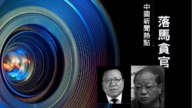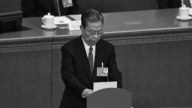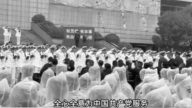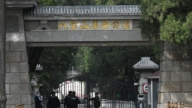【新唐人2012年12月26日訊】中共十八大後,習李新政展開。中共各級領導在各種場合的講話,突然被要求少用「講話稿」。但中共政權歷來形成的官場文化是﹕照著稿子一字不差的讀。因此,如何不照本宣科、脫稿說出口語化的工作報告,考驗著中共各級領導,攸關官員的仕途。中共領導人脫稿演出,會不會出亂子?看看專家怎麼說。
對於中共政府一把手來說,最重要的「講話稿」就是政府的工作報告。據大陸媒體《南方週末》報導,在嚴肅的場合,比如做政府工作報告時,領導會照著稿子一字不差的讀,半點發揮都沒有。
而對於相當一部分領導來說,「講話稿」在可有可無之間:不唸講話稿,是對「秘書班子」的不尊重,而照唸講話稿,又是對臺下群眾的不尊重。
報導指出,現實生活中,滿嘴官話、套話的領導也有,但不管開甚麼會,他們卻都「不加思考」的唸稿子,既不用擔責任,也不會出問題。
原《河北人民廣播電臺》編輯朱欣欣:「有個人的一些發揮的話,可能就存在著犯錯誤的危險,或者是,認為你不統一口令。就形成這種領導講話都照稿子唸。這種體制也造成這種作風很僵硬、殭化和教條,做事情缺乏靈活性,不能應對各種複雜的社會的形勢、各種各樣的矛盾。」
中共領導人照「講話稿」唸稿演出的這一作風,正成為中共中央改進的目標。今年12月4號,中共中央政治局召開會議,會議一致同意關於改進工作作風、密切聯繫群眾的八項規定,其中專門提到「要精簡會議活動,切實改進會風」、「提高會議實效,開短會、講短話,力戒空話、套話。」
時政評論員華頗認為,中共官員說話背後,都有筆桿子等幕僚來抓刀,但習、李想與其他領導人有所區別。華頗說,關鍵是他們怎麼做﹗是不是把事情做到實處,不再口惠而實不至﹗
時政評論員華頗:「以前領導人都是照本宣科(唸稿),習李這回上來,力圖給人一種清新的作風,來換取民眾對他們的信任。他們的稿子,我想當然旁邊要有些祕書、筆桿子為他們準備,但是用與不用,用多少,他們要有取捨的。」
報導指出,事實上,新一屆中央政治局常委已率先行動。11月15號,習近平在媒體見面會上做了一番簡練、親民、務實的發言。此後,李克強在全國綜合配套改革試點工作座談會上,打斷官員發言,要求不要唸稿,並且頻繁的即興提問。王岐山則在反腐座談會上,要求少說客套話,少用講話稿。
中國歷史教授李元華:「講話的出發點最重要。可是他們現在整個都是在抓形式上的東西,比如說,你一定要脫稿、你要表達自己。其實王岐山和李克強他們也不能真正表達自己想說的東西,他們也會瞻前顧後的,他們也會考慮中共權貴各派利益之間的東西,他們說的話也是很多都是身不由衷的話。」
報導說,隨著網路的傳播效力日益增強,許多官員意識到,「要用講話爭取老百姓的支持」。
華頗:「你如何使數萬上訪大軍能夠棄訪、罷訪,把那些徵地拆遷老百姓掠奪的財產還給人家,使那些有病的老百姓老有所養,孩子能夠有公平受教育的機會,官員的財產是不是能夠徹底的公開,這些是他們所要做的。」
習近平最近還吸納網路熱詞「積累正能量」,來作為講話元素。
但中國歷史教授李元華強調,他在講這些話的出發點是甚麼﹖是真正為百姓辦事情,還是說,只是為自己,保住這個官去說話,這是最關鍵﹗
採訪/李韻 編輯/周平 後製/鍾元
CCP’ Unscripted Speeches: Honesty or Chaos?
After the Chinese Communist Party’s (CCP) 18th congress,
Xi Jinping and Li Keqiang began with new leadership rules.
Leaders are requested to give speeches
by using as less scripts as possible.
The CCP’ officials’ culture is to read
every word written in the script.
Thus, it is a test for each official to give unscripted speeches,
it is important and it influences their career.
Will giving unscripted speeches lead to honesty,
or chaos amongst officials? Let’s take a look.
For a CCP’ governmental leader, the most important speech
is the one of presenting his work report.
The Southern Weekly newspaper in mainland China reported
that in a serious occasion, such as work report, leaders will read a script without an error, there is no room to play.
For some leaders, the script is indispensable:
it is a sign of respect to secretarial team and the audience.
The report said that in real life leaders talk with formality.
Regardless of the meeting, they will read without thinking.
They neither take responsibility for,
nor are worried about things going wrong.
Zhu Xinxin, former editor in Hebei People’s Radio Station:
“To let an individual talk, there is a risk of making mistakes.
Or you’d be seen as not “being on the same page” with others.
Therefore this habit of reading scripts had taken place.
This system is the leading cause
of forming such a stubborn and formal nature:
to do things with lack of flexibility, and to not be able
to deal with complicated situations and conflicts.”
Now, to change the habit of reading scripts
is becoming CCP’s next goal.
On December 4, 2012, the Central Politburo held a meeting,
and everyone agreed on eight rules to improve their work, and keep close ties with civilians.
It specially mentioned, “to streamline the meeting,
and practically, to improve the meeting quality.”
“To improve meeting’s efficacy by having short meetings,
and to talk concisely, avoiding empty and formality talks.”
Hua Po, Current Affairs’ commentator believes,
officials usually use assistance to prepare their scripts.
However, Xi Jinping and Li Keqiang
intend to be different.
Hua Po said that the key point is how to do it,
how to do it practically, without the empty talk!
Hua Po: “In the past, leaders read script in the meeting,
Xi and Li intend changing this to win the public.
Their scripts are certainly prepared by their secretaries,
but to use them or not, or how much to use, is up to them.”
The report pointed out that actually,
the new Politburo has taken the lead in this.
On November15, Xi gave a speech in a press conference,
and he talked to the point, approachable and practical.
Later, Li Keqiang interrupted official’s speech in a national
work meeting, asking them not to read the script. In addition, he raised prompt questions.
In an anti-corruption meeting, Wang Qishang requested
officials to use less formalities and the scripts.
Li Yuanhua, History Professor, China: “The aim of a speech
is the key. However, all of them now focus on the surface.
Such as you must abandon the script,
and express yourself.
Actually, Wang Qishang and Li Keqiang can’t say
what they want, they have to consider many things.
They have to consider the CCP’s different factions interests.
Most of their speeches were also not from their heart.”
The report says, with the increasing spread of Internet,
officials realize they can “use their speech to fight for people’s support."
Hua Po: “How to handle tens of thousands of petitioners?
To persuade them to abandon their petition visits,
and to return or resettle their looted properties?
How to take care of the sick,
and to create a fair education opportunities for children?
Or how to disclose fully officials’ ownerships?
These are all facts that people want to know about."
Recently, Xi Jinping used the Internet terms
“accumulate positive energy” as elements of his speech.
Prof. Li Yuanhua emphasized,
what is the purpose of Xi’s speech?
Does he really serve the people, or himself. Talking for
the sake of ensuring his position, is the major point!


























